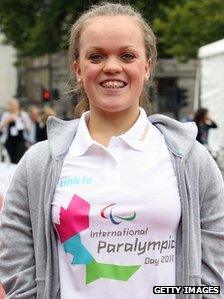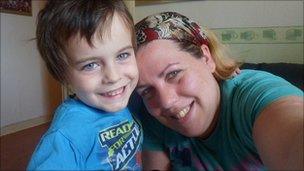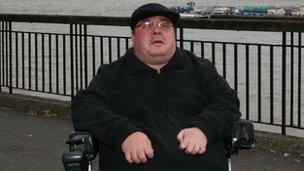London 2012: Paralympics divide opinion, survey suggests
- Published
- comments

Ellie Simmonds is one of Team GB's Paralympic gold medal contenders
Nearly one in four disabled people in Britain feels patronised by the Paralympics, but a similar number feel empowered by them, a survey suggests.
Some 61% of the 386 disabled people polled for charity Scope saw the Games as an opportunity for disabled people, but just 23% said they were excited.
One in five thought the Games made disabled people appear second class.
The British Paralympic Association said high ticket sales showed a big public appetite for Paralympic sport.
The Paralympics run from 29 August to 9 September next year in London and feature around 4,200 athletes in 20 sports, including South Africa's Oscar Pistorius and Britain's David Weir.
The Olympics take place from 27 July to 12 August.
The survey was carried out for disability charity Scope by ComRes, which held online interviews with 386 disabled adults and 111 parents (and eight carers) of disabled people in August.
While 22% said they felt patronised by the Paralympics, 23% said they felt empowered.
'More inclusive'
Only one-third of those polled planned to watch all or most Paralympic events.
The publication of the survey coincides with the International Day of Persons with Disabilities and the charity says the Paralympics have a crucial role to play at a time when attitudes towards disabled people are getting worse.
Between April and September, the number of disabled people claiming they had experienced aggression, hostility or name-calling rose from from 41% to 66%, said the charity.
Scope chairwoman Alice Maynard said the challenge for London 2012 was to make sure disabled people were involved not just on the track and field but throughout the Games and the celebrations.

Sarah Ellacott said holding the Paralympics separately allowed disabled athletes to be celebrated
"If the only disabled people that get any profile out of the Games are Paralympians… then it is unlikely that the Games will do much to change people's perceptions of ordinary disabled people," she said.
On Friday, remaining Paralympics tickets for 2012 went back on sale, after more than one million of the two million available tickets sold out in a first phase of sales.
Tim Hollingsworth, CEO of the British Paralympic Association, said: "The brilliant success of ticket sales and the increase in media coverage indicates to me that, contrary to the survey's sample, there is a big public appetite for Paralympic sport."
International Paralympic Association spokesman Craig Spence said the Games were a "showcase of elite sport which highlight what can be achieved by people with an impairment".
"We benefit from having surveyed hundreds of thousands of people over decades in various countries, as opposed to just a few hundred people, and our data indicates that perceptions of people with an impairment change for the better following a Games and make for a far more inclusive society," he said.
'Rare opportunity'
Sarah Ellacott is taking her five-year-old son Matthew to Paralympic swimming and athletics events. She said that while he was thrilled, any lack of excitement suggested by the survey was not surprising, due to the small amount of advertising the Paralympics has received compared with that for the Olympics.

Wapping-based Pat Davey said he felt excluded by London 2012 even though it was on his doorstep
"You shouldn't combine the Paralympics with the Olympics," the 28-year-old mother-of four, from Croydon, told the BBC. "It's nice to have them separately so you can celebrate the disabled athletes on their own."
Kath Vickery from Somerset, who was registered as blind in 2006, said London 2012 offered a rare opportunity to go to the Paralympics.
"I'm excited because I think the Paralympics could elevate the standing of disability sport in the UK and raise its profile," said the 28-year-old.
Both Ms Vickery and Ms Ellacott are among a group of people with Paralympics tickets the BBC is following in the run-up to the Games.
Another of the group, Ruth Faulkner, said any lack of excitement about the Paralympics was a shame, as was the lack of any Paralympic athletes featuring on the shortlist for BBC Sports Personality of the Year, external.
"If anything, watching Paralympic sports - and I'm thinking wheelchair basketball here - is more exciting," the 21-year-old London student told the BBC.
Sold out
But Pat Davey said he was not excited about the Paralympics because he could not get a ticket. The Wapping-based wheelchair user said he could not get the visa card required to buy tickets because he received disability benefits.
"I'd like to show some support because the Games are on my doorstep, but I feel excluded," he told the BBC.
Tickets are available on a first-come, first-served basis until they sell out or the sale window closes at 1800 GMT on 6 February.
No tickets remain for track cycling and the marathon, while seats have also sold out for wheelchair rugby and wheelchair tennis.
- Published2 December 2011
- Published14 December 2011
- Published18 November 2011